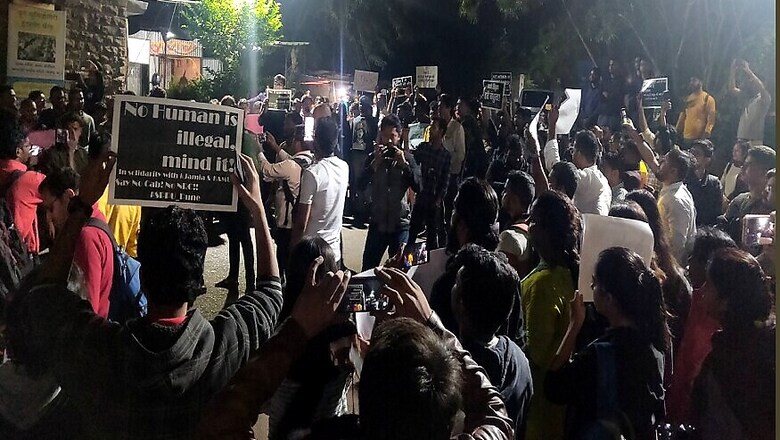
views
Pune/Thane: Assamese community members staged a protest on Wednesday in Pune against the Citizenship Act, claiming it endangers the culture of Assam and ignores sentiments of people of the north-eastern state.
Several people also participated in a protest march against the National Register of Citizens (NRC) and the Act in Mumbra, a predominantly Muslim township near Mumbai.
In Pune, over 200 members of the Assamese community, mostly students and working professionals from the north- eastern state, gathered outside the Sambhaji Garden and staged a protest against the Act.
Bidyut Saikia, a protester, said, "We oppose this new law and the government has enacted it without considering sentiments of the people and the harmony of the multi-communal state of Assam."
The law will wreak havoc, create misunderstandings among people, and question the sole existence of the original Assamese culture, he said. The Act will lead to "erosion of ethnic, cultural and linguistic identity" of the Assamese people, he said.
"This Act directly endangers the culture of Assam as the inclusion of immigrants under it will not only wreak havoc and create misunderstanding among people, but also question the sole existence of the original culture of Assamese people, who are already in minority in their own state," Saikia said.
The new legislation will lead to erosion of ethnic, cultural and linguistic identity of the indigenous Assamese people, he said.
People from various communities/religions, such as Hindus, Muslims, Christians, Sikhs, Buddhists and others, who have been living along with members of the Assamese community in peace and harmony have adopted the Assamese culture in due course of time and vice-versa.
"The inclusion of immigrants, who have little or no idea about our culture and heritage, is a direct threat to our identity and our peaceful balance in social topography," said Saikia, who works at a private firm in Pune.
He said their protest was not on any religious lines. "We are against illegal immigrants and we do not want anybody, be it Muslims or Hindus, from Bangladesh," he said.
Saikia said there was a big agitation against Bangladeshi immigrants in Assam between 1979 and 1985.
"When the Assam Accord was signed, it was decided that only Bangladeshis who came to the state before 1971 will be allowed here," he said.
"But during the Congress regime, illegal immigrants from Bangladesh kept coming and now it has become such a big issue that Assam's indigenous people are in minority in 14 districts," Saikia claimed.
In 2014, when the BJP came to power, it promised that all Bangladeshi immigrants will be driven out of the state, he said. "It has been five years and not a single Bangladeshi has been driven out," he added.
"Now with the help of the Act, there are attempts to provide citizenship to Bangladeshi Hindus, who are staying here illegally," he said.
Tonmoy Goswami, another protester from the community, said the Act also nullifies the Assam agitation (1979-85) in which 855 people sacrificed their lives in the hope of an infiltration-free state.
In Mumbra, the protesters carried banners and placards condemning the NRC and the Act and shouted anti-government slogans. Most shops in the area downed their shutters and auto rickshaws remained off the roads.
The protest march started from the Shimla Park and ended near the railway station. At a rally held later, speakers claimed the Act and NRC were designed to divide Hindus and Muslims.
Protests have broken out across the country, including in universities, against the amended act, which seeks to provide citizenship to persecuted minorities from Pakistan, Afghanistan and Bangladesh.




















Comments
0 comment